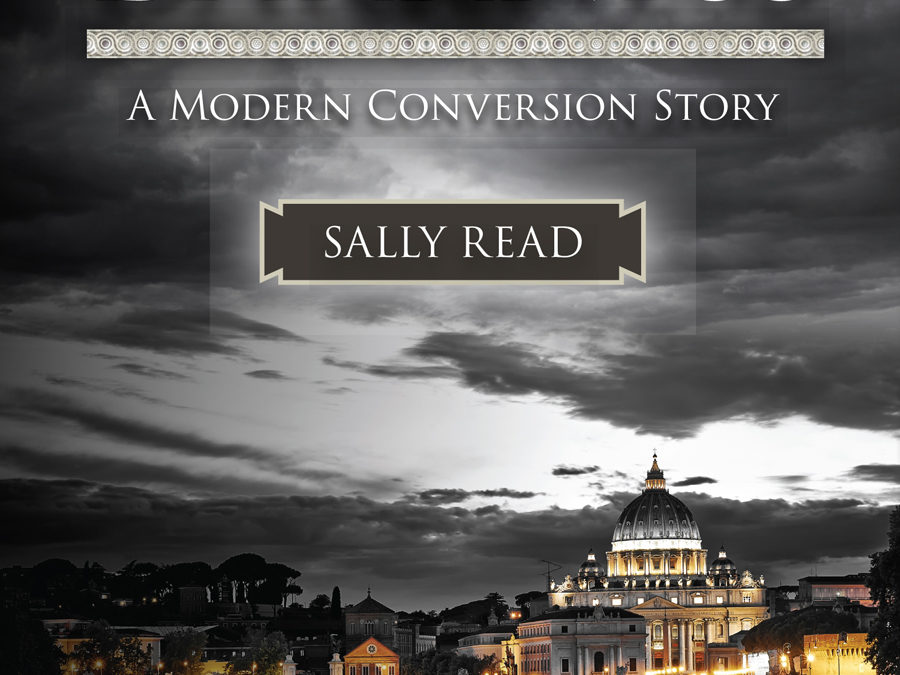Night’s Bright Darkness:
A Modern Conversion Story
by Sally Read
–Review by Teri Hyrkas
Sally Read, health professional, lauded poet and author of the spiritual memoir Night’s Bright Darkness: A Modern Conversion Story, (Ignatius Press, 2016) was raised in a home that was not simply areligious, it was vehemently anti-religious. Her father, whom she loved and admired, was a confirmed atheist and his daughter followed suit. Sally writes that, “It was dinned into me never to kneel before anyone or anything, ” and that “[Christians], in particular, were tambourine bashing intellectual weaklings.” When her father died after a three month illness at age fifty-six, Read experienced a time of debilitating grief. “When I sat in restaurants and bars I felt a cry deep in my belly that I thought would actually escape. I lost weight. My bleach-blonde hair fell out in handfuls.”
Read continued her work as a psychiatric nurse in the heart of London as she grieved the loss of her father but became increasingly despondent and disillusioned with life. The one thing that allowed her to make sense of the world was poetry.”One morning I wrote my first real poem…. Even if I never wrote another thing, I knew I was a poet. A new strength powered me along the street to work. I felt as though I nursed a secret that would nourish me through weakness and sadness and devastation.”
A number of years later, Read’s life had changed significantly: she was a published poet, lived in Sardinia, Italy, was married to an Italian man and had become a mother. The aspect of her life that remained unaltered and solidly entrenched was her atheism. However, the needs of a child can make parents surprisingly tolerant, so in the process of finding playmates for her daughter, Flo, Read came to know several devout American Catholic women. One of the mothers, Cristina, had a child about Flo’s age, a gracious manner and the welcome mat out. Cristina also had connections with the other Catholic mothers in the neighborhood. Read says, “When over coffee and renditions of “The Wheels on the Bus,” I became aware of their views and beliefs on contraception and abortion, I was appalled….Should I let my daughter mix with a crowd of religious nuts so she could socialize?… I had to gnaw on my tongue when I was given Holiness for Housewives and was invited to a meeting to discuss it…. Their God was a close God. He entered in to every sore throat, full diaper, sleepless night and burnt dinner…The linear connection of prayer and effect made God seem a puppet master in the sky, dispensing favor and punishment. It concretized my atheism.”
The more time Read spent with her new Catholic friends the more perplexed she became. She was starting a writing project about female sexual anatomy and although other women friends had agreed to talk to her about their bodies, none of the Catholic women would. She wanted a Catholic perspective, so sought out the only other Catholic person she could think of – a shirttail friend who was a Canadian Byzantine priest. Read emailed Father Gregory with a request to talk about her writing project over coffee; Father Gregory, who was not put off by the subject of her book, thought he might be able to find a Catholic woman who would speak with Read, so a date was set to meet. Before their meeting, news of sex abuse scandals and Irish child abuse stories in the Catholic Church began pouring out of every news source; the year was 2010. By the time Read met with Father Gregory, her list of questions for the priest had broadened appreciably. Read was angry and wanted to hold someone in the Church responsible for the atrocities. “I wanted,” wrote Read,” more than anything else, to know how someone intelligent, someone moral, could belong to such a church. [Father Gregory] agreed to answer my questions…”
Through their numerous visits and emails, which Read describes as “sparring” and “fighting,” Read began to experience a restlessness and insomnia that wouldn’t abate. She sought the arts and familiar books for solace. In a favorite book, Dodie Smith’s I Capture the Castle, she came upon a passage that stunned her: “[Religion] is an art, the greatest one; an extension of the communion all the other arts attempt.”
Sally writes, “Why, after so many years of thinking, reading, arguing, would this truth penetrate me now? It was as if the tin roof of the sky peeled away. My desperate yearning to write the line, to make the poem, to nail the truth was illuminated. It wasn’t for editors, prizes, readers or myself that I sought so earnestly to harness reality. It was for communion with God, who knows already, who has the metaphor, the poem, already in hand, who is already writing, has already written, the ultimate poem. It was to try to touch that poem.
“That night, I barely apprehended this. What I thought was just one word: possibility… I had begun to learn how to listen.”
The pilgrimage by which Read moves from “concretized atheism” to accepting the truth of God’s existence and then, in less than a year, to baptism in the Catholic Church, is an astonishing and gripping tale. That Read is a poet adds a clarifying dimension to her narrative as well; she doesn’t poetically embellish her journey of faith as much as she finds its essence and distills it. The final product is rich, genuine, and powerful. Night’s Bright Darkness: A Modern Conversion Story by Sally Read would be an excellent choice for book clubs.

